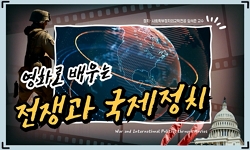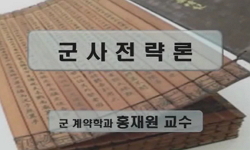In 2003, the ROK government decided to send combat troops to Iraq. At the time, the ongoing social discourse surrounding the dispatch of combat troops was very negative not only because of the prevalent criticism that the war could not be legitimized ...
http://chineseinput.net/에서 pinyin(병음)방식으로 중국어를 변환할 수 있습니다.
변환된 중국어를 복사하여 사용하시면 됩니다.
- 中文 을 입력하시려면 zhongwen을 입력하시고 space를누르시면됩니다.
- 北京 을 입력하시려면 beijing을 입력하시고 space를 누르시면 됩니다.

한국전쟁, 그리고 베트남 전쟁의 기억과 참전의 악순환 = Memory of the Korean War and the Vietnam War, and the Vicious Circle of Entering into Wars
한글로보기https://www.riss.kr/link?id=A104158689
-
저자
박태균 (서울대학교)
- 발행기관
- 학술지명
- 권호사항
-
발행연도
2011
-
작성언어
Korean
-
주제어
Memory of a war ; Iraqi War ; Vietnam War ; Korean War ; Japanese War in Manchuria ; Roh Mu Hyun Government ; Special procurement ; 전쟁의 기억 ; 이라크 전쟁 ; 베트남 전쟁 ; 한국전쟁 ; 만주사변 ; 노무현 정부 ; 전쟁 특수
-
등재정보
KCI등재
-
자료형태
학술저널
- 발행기관 URL
-
수록면
155-183(29쪽)
-
KCI 피인용횟수
4
- 제공처
- 소장기관
-
0
상세조회 -
0
다운로드
부가정보
다국어 초록 (Multilingual Abstract)
What triggered the change was the passing of the UN Security Council resolution on the Iraqi democratization. Other factors included the social discourse on 'national interest', which was closely related to the Korea-US security alliance and the special procurement that was expected resulting from the Iraqi War. These factors were operating within the social consensus. In particular, the memory of the special procurement from the Vietnam War was affecting the public consensus.
At the same time, there was another memory concerning special procurement that Japan benefited from, during the Korean War became currency subject of interest in Korean society in 2003. The Japanese government’s decision to send the Self Defense Forces to Iraq and to spare financial support to the Bush Administration revived the memory. In fact, the memory on Japanese special procurement during the Korean War had emerged in the mid 1960s when the ROK government consulted with the Johnson Administration about the special procurement from the Vietnam War.
In sum, the memory of the special procurement of wars brought about the vicious circle of entering into wars in East Asian countries. This type of memory may have been formed due to the special economic benefit from the 1931 Manchurian War, which occurred exactly 80 years ago. In order to solve this problem, it would be necessary to recollect the forgotten memories on the very negative effects of wars.
In 2003, the ROK government decided to send combat troops to Iraq. At the time, the ongoing social discourse surrounding the dispatch of combat troops was very negative not only because of the prevalent criticism that the war could not be legitimized but also in the South Korean civil society. However, a public opinion taken shortly after the government’s decision to enter the war on October 18, 2003, showed that over 50% of the respondents supported the government’s decision. This was a starkly different from the public opinion just one month ago.
What triggered the change was the passing of the UN Security Council resolution on the Iraqi democratization. Other factors included the social discourse on 'national interest', which was closely related to the Korea-US security alliance and the special procurement that was expected resulting from the Iraqi War. These factors were operating within the social consensus. In particular, the memory of the special procurement from the Vietnam War was affecting the public consensus.
At the same time, there was another memory concerning special procurement that Japan benefited from, during the Korean War became currency subject of interest in Korean society in 2003. The Japanese government’s decision to send the Self Defense Forces to Iraq and to spare financial support to the Bush Administration revived the memory. In fact, the memory on Japanese special procurement during the Korean War had emerged in the mid 1960s when the ROK government consulted with the Johnson Administration about the special procurement from the Vietnam War.
In sum, the memory of the special procurement of wars brought about the vicious circle of entering into wars in East Asian countries. This type of memory may have been formed due to the special economic benefit from the 1931 Manchurian War, which occurred exactly 80 years ago. In order to solve this problem, it would be necessary to recollect the forgotten memories on the very negative effects of wars.
국문 초록 (Abstract)
2003년 한국 정부는 이라크 전쟁 한국 전투부대의 파병을 결정하였다. 당시 전 세계적으로 뿐만아니라 한국 내에서도 이라크에서 전개된 미국의 전쟁이 명분이 없다는 비판이 제기되고 있었...
2003년 한국 정부는 이라크 전쟁 한국 전투부대의 파병을 결정하였다. 당시 전 세계적으로 뿐만아니라 한국 내에서도 이라크에서 전개된 미국의 전쟁이 명분이 없다는 비판이 제기되고 있었기 때문에 전체적인 여론은 전투부대 파병에 반대에 부정적이었다. 그러나 동년 10월 18일 한국 정부가 전투부대 파병을 결정하는 시점에서의 여론 조사에서는 이전과는 달리 파병에 찬성하는 여론이 50%를 넘었고, 이는 파병 결정에 중요한 근거가 되었다. 이렇게 여론이 바뀐 것은 유엔 안보리에서 이라크의 민주화와 관련된 결의안을 제출한 것이 가장 중요한 원인이 되었지만, 이와 함께 이라크 파병을 통한 ‘한미동맹’의 강화, 그리고 ‘전쟁 특수’를 고려한 ‘국익’의 측면에 대한 고려가 적지 않았다. 특히 여기에서 주목되는 것은 이라크 파병을 전후하여 베트남 파병에 대한 사회적 기억이 다시 도출되고 있다는 점이다. 베트남 파병과 이후 중동 진출을 통한 특수가 한국 경제성장의 밑거름이 되었다는 역사적 기억이 사회적으로 작동한 것이다. 이와 함께 일본이 한국전쟁 기간 동안 경험했던 전쟁특수의 문제 역시 중요한 사회적 기억의 측면이었다. 일본 자위대의 이라크 파병과 일본 정부의 미국에 대한 재정적 지원은 이러한 기억을 재생하도록 하였다. 실상 일본의 한국전쟁 특수에 대한 기억은 이미 1960년대 한국군의 베트남 파병 기간을 통해 재현된 적이 있었다. 결국 이렇게 전쟁과 파병에 대한 특정한 형태의 기억은 동아시아에서 전쟁의 악순환을 불러오고 있다. 이미 한국인들은 80년 전인 1931년의 만주사변으로부터 그 기억을 거슬러 올라갈 수 있을 것이다. 이러한 특정한 방향으로의 기억은 동아시아에서 전쟁의 악순환을 불러올 가능성이 크며, 평화를 위해 잊혀져 있는 중요한 기억들의 재생이 필요하다.
참고문헌 (Reference)
1 유용태, "함께 읽는 동아시아 근현대사" 창비 2011
2 주성수, "한국민주주의와 시민참여" 아르케 2007
3 박태균, "일본이 바라보는 한국전쟁: 일본 역사교과서의 내용을 중심으로" 국제학연구소 17 (17): 27-49, 2008
4 김영직, "사료로 본 한국의 정치와 외교 1945~1979" 성신여자대학교 출판부 2005
5 박태균, "베트남 파병을 둘러싼 한미 협상 과정: 미국 문서를 중심으로" 역사문제연구소 (74) : 144-189, 2006
6 김재용, "내선일체의 연장으로서의 만주국 인식-장혁주의 행복한 백성을 중심으로" 한국근대문학회 6 (6): 308-325, 2005
7 조석준, "기획, In 한국행정의 역사적 분석 1948~1967" 한국행정문제연구소 408-418, 1967
8 정종현, "근대문학에 나타난 ‘만주’ 표상-‘만주국’ 건국 이후의 소설을 중심으로" 한국문학연구소 (28) : 229-260, 2005
9 서재길, "‘제국’의 전파 네트워크와 만주의 라디오 방송" 한국문학연구소 33 (33): 171-203, 2007
10 Park, Hyun Ok, "Two Dreams in One Bed" University Press 2005
1 유용태, "함께 읽는 동아시아 근현대사" 창비 2011
2 주성수, "한국민주주의와 시민참여" 아르케 2007
3 박태균, "일본이 바라보는 한국전쟁: 일본 역사교과서의 내용을 중심으로" 국제학연구소 17 (17): 27-49, 2008
4 김영직, "사료로 본 한국의 정치와 외교 1945~1979" 성신여자대학교 출판부 2005
5 박태균, "베트남 파병을 둘러싼 한미 협상 과정: 미국 문서를 중심으로" 역사문제연구소 (74) : 144-189, 2006
6 김재용, "내선일체의 연장으로서의 만주국 인식-장혁주의 행복한 백성을 중심으로" 한국근대문학회 6 (6): 308-325, 2005
7 조석준, "기획, In 한국행정의 역사적 분석 1948~1967" 한국행정문제연구소 408-418, 1967
8 정종현, "근대문학에 나타난 ‘만주’ 표상-‘만주국’ 건국 이후의 소설을 중심으로" 한국문학연구소 (28) : 229-260, 2005
9 서재길, "‘제국’의 전파 네트워크와 만주의 라디오 방송" 한국문학연구소 33 (33): 171-203, 2007
10 Park, Hyun Ok, "Two Dreams in One Bed" University Press 2005
11 Eckert, Carter J., "Offspring of Empire: The Kochang Kims and the Colonial Origins of Korean Capitalism 1876-1945" University of Washington Press 1945
12 Department of State, "Foreign Relations of the United States 1964-1968 Vol. XXIX, Part I: Korea" Government Printing Office 2000
13 박태균, "2009 개정 교육과정 한국사 교과서 현대사 부분 분석" 역사교육연구회 116 (116): 315-345, 2010
동일학술지(권/호) 다른 논문
-
지속가능한 동북아시아 해양질서의 모색: 우리나라의 해양정책과 그 정책적 함의를 중심으로
- 서울대학교 국제학연구소
- 구민교
- 2011
- KCI등재
-
이주자 통합정책 유형과 통합정책 전환에 대한 분석: 스웨덴과 네덜란드의 사례를 중심으로
- 서울대학교 국제학연구소
- 유숙란
- 2011
- KCI등재
-
지구화 시대 지역연구 지식의 재구성: 방법에 대한 논의를 중심으로
- 서울대학교 국제학연구소
- 김미덕
- 2011
- KCI등재
-
국가 · 민족 · 종족의 정치: 코트디부아르 정치위기의 사례
- 서울대학교 국제학연구소
- 조홍식
- 2011
- KCI등재
분석정보
인용정보 인용지수 설명보기
학술지 이력
| 연월일 | 이력구분 | 이력상세 | 등재구분 |
|---|---|---|---|
| 2022 | 평가예정 | 재인증평가 신청대상 (재인증) | |
| 2019-01-01 | 평가 | 등재학술지 유지 (계속평가) |  |
| 2016-01-01 | 평가 | 등재학술지 선정 (계속평가) |  |
| 2015-12-01 | 평가 | 등재후보로 하락 (기타) |  |
| 2011-01-01 | 평가 | 등재 1차 FAIL (등재유지) |  |
| 2009-01-01 | 평가 | 등재학술지 유지 (등재유지) |  |
| 2007-01-01 | 평가 | 등재학술지 유지 (등재유지) |  |
| 2004-01-01 | 평가 | 등재학술지 선정 (등재후보2차) |  |
| 2003-01-01 | 평가 | 등재후보 1차 PASS (등재후보1차) |  |
| 2001-07-01 | 평가 | 등재후보학술지 선정 (신규평가) |  |
학술지 인용정보
| 기준연도 | WOS-KCI 통합IF(2년) | KCIF(2년) | KCIF(3년) |
|---|---|---|---|
| 2016 | 0.5 | 0.5 | 0.39 |
| KCIF(4년) | KCIF(5년) | 중심성지수(3년) | 즉시성지수 |
| 0.4 | 0.37 | 0.67 | 0.08 |




 KCI
KCI







